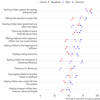Author: American Association for the Advancement of Science
Published: 14th Mar 2018
Peer-Reviewed Publication: N/A
Additional References: Education and LGBT Publications
Summary: Coming out in STEM: Factors affecting retention of sexual minority STEM students - Sexual minority students - lesbian, gay, bisexual and queer - less likely than their heterosexual peers to be retained in STEM degrees after 4 years of college.
Sexual minority students - lesbian, gay, bisexual and queer - were less likely than their heterosexual peers to be retained in STEM degrees after four years of college, suggests a new study based on a national survey of more than 4,000 college students.
Diversity is crucial in STEM fields, providing a greater likelihood of reaching breakthroughs.
However, compared to other minority groups, the LGBQ community has received little attention in conversations regarding broadening participation in STEM, says author Bryce E. Hughes. Previous studies have suggested, but not conclusively determined, that sexual minority STEM students persist at lower rates in these majors compared to their heterosexual counterparts.
To verify this, Hughes used data from the Higher Education Research Institute's national longitudinal survey, one of the first such samples of college students that allowed disaggregation by sexual orientation. The data included responses from 4,162 STEM college students at 78 institutions. Hughes used this data to determine if sexual minority status lowered the likelihood of retention in a STEM major by the fourth year of college.
(Article continues below image.)
 Bryce E. Hughes evaluated data from a national longitudinal survey, including responses from over 4,000 students, and found that sexual minority students - lesbian, gay, bisexual and queer - were less likely than their heterosexual peers to be retained in STEM degrees after four years of college - Image Credit: Carla Schaffer / AAAS.
Bryce E. Hughes evaluated data from a national longitudinal survey, including responses from over 4,000 students, and found that sexual minority students - lesbian, gay, bisexual and queer - were less likely than their heterosexual peers to be retained in STEM degrees after four years of college - Image Credit: Carla Schaffer / AAAS.(Continued...)
The results showed that sexual minority students were 8% less likely than heterosexual students to persist in STEM degrees by their fourth year of college, with this likelihood increasing to nearly 10% when controlling for other factors that increased a student's likelihood of being retained in STEM, such as parent employment in STEM and better high school grades.
Surprisingly, sexual minority STEM students were more likely to have participated in undergraduate research when starting out, theoretically increasing their chances of having had sustaining, high-quality interactions with faculty and of gaining a sense of "STEM identity" that would have helped them to persist at higher rates (though they did not).
Hughes also found that the probability of retention for sexual minority men was lower than for heterosexual men, whereas sexual minority women's probability to complete a STEM degree was greater than that of heterosexual women.
These findings highlight the need to further address gender and sexual minority status in STEM, Hughes says. For example, STEM educators should be encouraged that sexual minority STEM aspirants are participating in undergraduate research at higher rates and perhaps further assess these experiences, with that in mind.
Post to Twitter Add to Facebook
| Latest Education and LGBT Publications | |
|---|---|
The above information is from our reference library of resources relating to Education and LGBT that includes: | |
 | LGBTQ+ Young Adults with IDD: Recreational Therapists Perspectives Lesbian, Gay, and Bisexual young adults with intellectual and developmental disabilities: recreational therapists perspectives. Publish Date: 12th Nov 2024 |
 | High School Biology Textbooks Do Not Provide Comprehensive View of Sex and Gender Textbooks used by a majority of introductory U.S. biology classes paint a Men are from Mars, Women are from Venus image, running afoul of scientific evidence. Publish Date: 22nd Feb 2024 |
   | Teaching Controversial Topics in U.S. Schools: How Americans Really Feel Americans united on core principles like importance of public education and parental involvement, but diverge on the details. Publish Date: 22nd Feb 2024 |
 | How Sex Education Training Videos Can Be More Inclusive The article explores several lessons learned about inclusivity during formative research and video production efforts. Publish Date: 2nd Dec 2022 - Updated: 5th Jan 2023 |
1Adult Dating: Local Women & Men
Search for local females and males.
2Am I Gay? Questions to Ask
Think you may be gay or bisexual?
3Glossary of Sexuality Terms
Definitions of sexual terms & acronyms.
4LGBTQ+ Pride Flags
Symbols of Identity and Inclusion.
5Adult FriendFinder Dating for Adults
Find like minded people locally.
• Submissions: Send us your coming events and LGBTQ related news stories.
• Report Errors: Please report outdated or inaccurate information to us.
• (APA): American Association for the Advancement of Science. (2018, March 14). Are Sexual Minority Students Less Likely to Persist in STEM Degrees. SexualDiversity.org. Retrieved February 2, 2026 from www.sexualdiversity.org/edu/887.php
• Permalink: <a href="https://www.sexualdiversity.org/edu/887.php">Are Sexual Minority Students Less Likely to Persist in STEM Degrees</a>